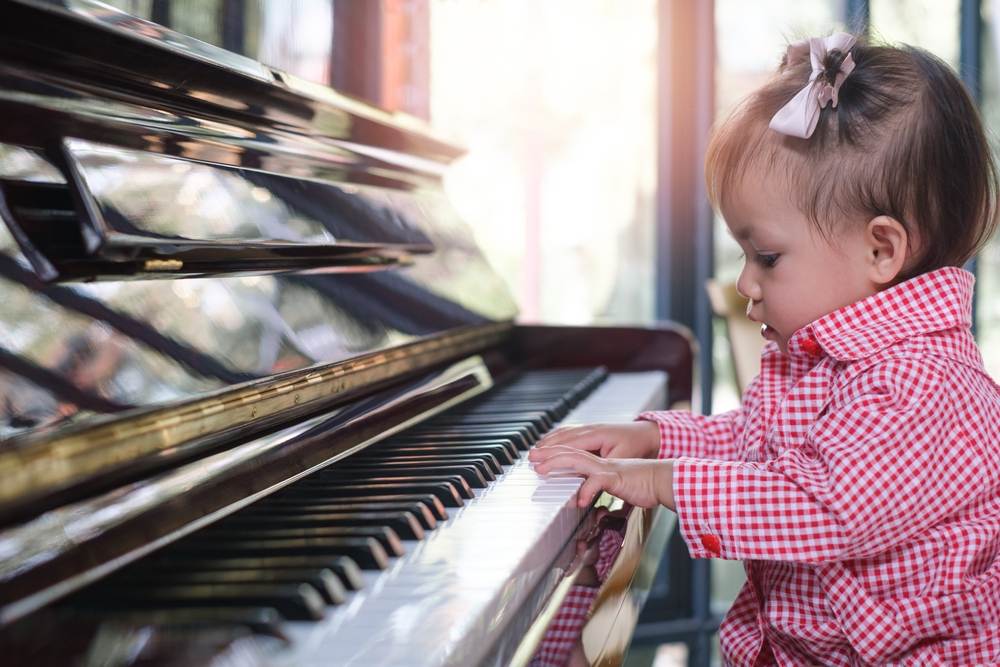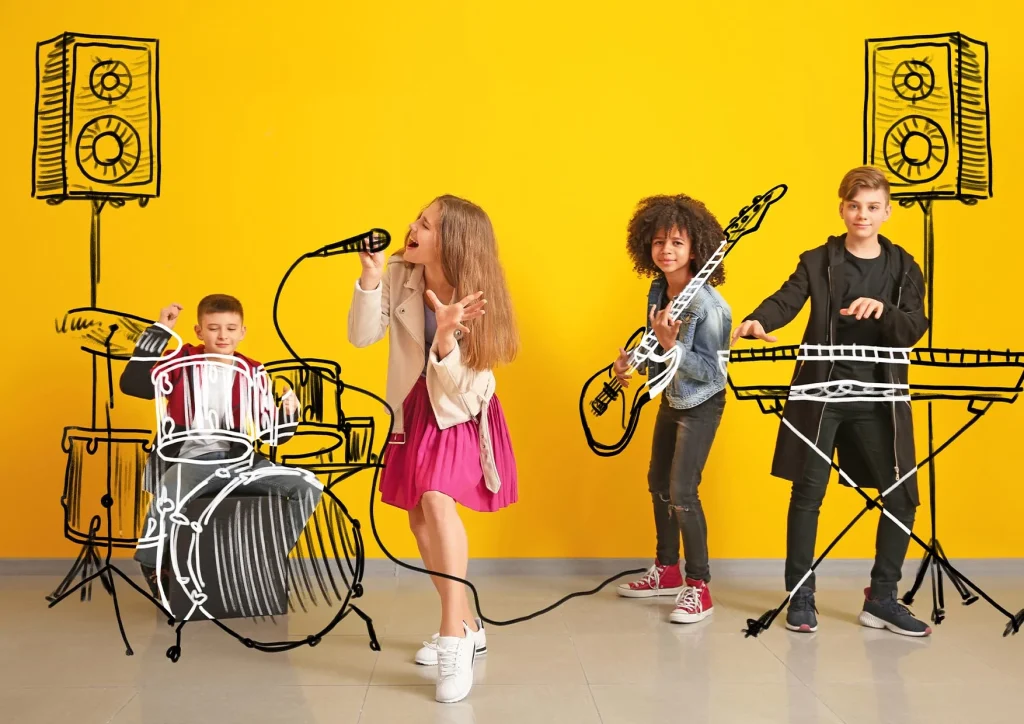Blog
“Best Instruments for Kids: Fostering a Love for Music Early”
Introducing children to music at an early age can have numerous benefits, from improving cognitive skills and emotional development to enhancing motor skills and social interaction. One of the most enjoyable ways to nurture this love for music is by encouraging children to explore different musical instruments. But with so many options available, which instruments are best suited for young beginners? In this guide, we’ll explore the best musical instruments for kids, offering a perfect blend of fun, ease of learning, and developmental benefits.
1. The Ukulele: Small, Simple, and Fun
The ukulele is an excellent choice for children of all ages. Its small size makes it perfect for little hands, and its light strings are easy to press, reducing frustration for young learners. The four strings of a ukulele are also easier to learn than the six strings of a guitar, making it ideal for beginners. The cheerful, upbeat sound of the ukulele appeals to kids, and the simple chord progressions allow them to play songs quickly, fostering a sense of accomplishment early on. Moreover, its portability makes it great for travel, whether you’re going on vacation or attending a family gathering.
Why it’s great for kids:
- Easy to learn
- Small and lightweight
- Encourages quick song playing and creativity
- Fun, bright sound that engages children
2. The Keyboard: A Versatile Introduction to Music Theory

A keyboard (or piano) is one of the most popular instruments for kids, thanks to its versatility and educational benefits. It provides an introduction to music theory, as children can easily understand the layout of notes. Unlike string instruments, which require more finger coordination and pressure, the keyboard involves pressing keys, which is relatively easier for younger hands. The vast range of sounds that can be created on a keyboard also keeps children engaged and excited to explore different genres of music.
Why it’s great for kids:
- Develops understanding of music theory
- Easy to pick up for young hands
- Wide variety of sounds and styles to explore
- Provides a foundation for learning other instruments
3. Percussion Instruments: Fun and Rhythmic Learning
Percussion instruments, such as drums, tambourines, maracas, and xylophones, are fantastic choices for younger children who love to make noise! These instruments are often simple to play and require minimal instruction. Percussion helps children develop a sense of rhythm, improve motor skills, and even enhance coordination. Instruments like a drum set or a glockenspiel allow kids to create different sounds and patterns, promoting creativity while improving their listening and timing skills.
Why it’s great for kids:
- Encourages rhythm and timing skills
- Simple to learn and play
- Great for improving coordination and motor skills
- Fun and energetic sound that keeps kids engaged
4. The Violin: A Classic Start for Young Musicians
For kids with an interest in string instruments and classical music, the violin is a perfect introduction. While learning the violin can be a bit more challenging than other instruments, it can be extremely rewarding. Violin teachers often work with younger students to build proper posture, bowing techniques, and finger positioning. The violin’s ability to produce a wide range of expressive sounds makes it an inspiring choice, and the early skills learned with the violin can transfer to other string instruments later on, such as the cello or guitar.
Why it’s great for kids:
- Teaches discipline and perseverance
- Encourages proper posture and motor skills
- Provides a good foundation for learning other string instruments
- Excellent for developing a sense of musical expression
5. The Recorder: A Traditional and Affordable Wind Instrument
The recorder is often one of the first wind instruments introduced to young children in school. Its affordability, ease of use, and relatively simple learning curve make it a popular choice for beginners. Children can learn basic notes and melodies on the recorder quickly, making it a rewarding instrument to play. Since the recorder is small and lightweight, it’s an ideal choice for younger children who are ready to explore wind instruments without the complexity of a larger instrument like a flute or clarinet.
Why it’s great for kids:
- Simple and affordable
- Develops breathing and wind control
- Teaches basic music theory
- Portable and lightweight
6. The Guitar: Classic and Fun for Older Kids

For children aged 6 or older, the guitar can be a fantastic option. While it can be more challenging than other instruments, the guitar is versatile and can be used to play almost any style of music. Beginners can start with basic chords and simple songs before progressing to more advanced techniques. The popularity of the guitar among children’s music culture (think about the influence of bands, rock music, and even kid-friendly shows) makes it an instrument that many young learners are eager to explore.
Why it’s great for kids:
- Develops finger strength and dexterity
- Great for playing a wide variety of music genres
- Inspires creativity and musical expression
- Suitable for older children and teenagers
7. The Harmonica: Small, Fun, and Easy to Carry
The harmonica is a small and portable wind instrument that can be played anywhere. It’s a great option for younger children, as it doesn’t require much air control and is relatively simple to learn. The harmonica is also versatile and can be used to play blues, rock, folk, or pop music. Since it fits easily in a pocket or bag, kids can bring it with them wherever they go, providing endless opportunities for spontaneous music-making.
Why it’s great for kids:
- Simple to play and easy to learn
- Small, portable, and fun
- Encourages musical creativity and ear training
- A good introduction to wind instruments
8. The Cello: A Beautiful Option for Kids Who Love Classical Music
Though it may seem like an advanced instrument, the cello can be a great choice for kids who are particularly interested in classical music. The cello offers a deep, rich sound that is soothing and powerful, and learning to play it fosters good posture, strong hands, and a deep understanding of music. Cello students often start with smaller cellos designed for children, so even very young learners can get started. This makes it an ideal choice for serious music students who want to explore orchestral music.
Why it’s great for kids:
- Provides a rich, expressive sound
- Great for developing discipline and musical skills
- Works well in orchestras and ensembles
- Suitable for kids with an interest in classical music
Conclusion: Fostering a Lifelong Love of Music
Choosing the best instrument for your child depends on their interests, age, and learning style. Whether they are drawn to the rhythm of percussion, the charm of the ukulele, or the beauty of string instruments, exposing kids to music early helps them build valuable skills that extend far beyond just playing an instrument. Music fosters creativity, enhances cognitive development, and provides a wonderful outlet for emotional expression. By choosing an instrument that fits your child’s personality and interests, you are giving them the gift of music—a gift that lasts a lifetime.


